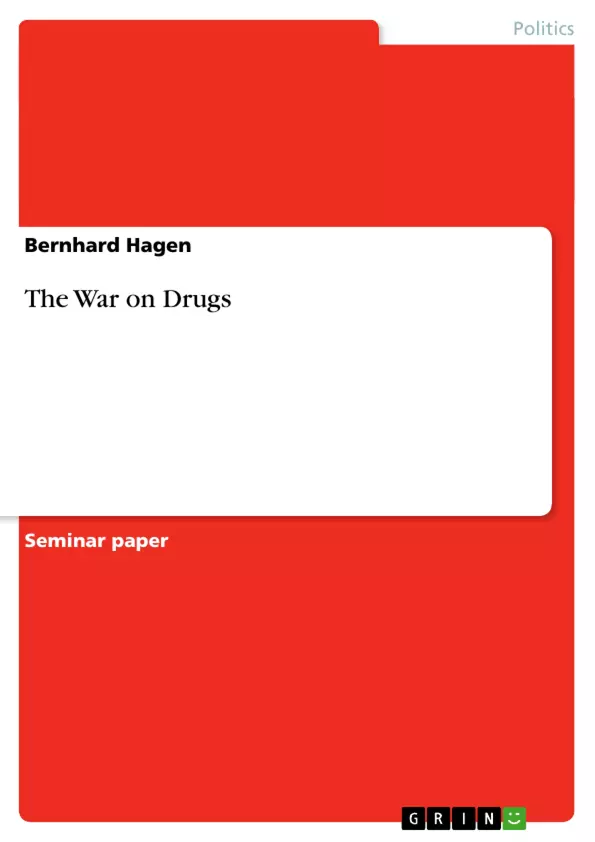In this paper, I want to discuss the “War on Drugs” in the 1980ies and early 90ies and compare the US approach of each period. Declared by President Reagan, the war on drugs changed under President Bush, and there are also a few differences under the Clinton Administration. What were and are the major threats for the United States, and how did the US try to act against them? Which impact had the war on drugs on Latin America? Was the war on drugs successful? Which administration had the best and most successful approach to this topic?
Inhaltsverzeichnis (Table of Contents)
- I. Introduction
- II. The Reagan Administration
- II.1. Launching the War on Drugs: Tough Words...
- II.2....but weak actions?
- III. The Bush Administration
- III.1. Demand side
- III.2. Militarization
- III.3. Unilateral, Bilateral or Multilateral?
- IV. The Clinton Administration
- IV.1. Situation in the early 90ies......
- IV.2. The continuing story - no change?
- V. Conclusion
Zielsetzung und Themenschwerpunkte (Objectives and Key Themes)
This term paper analyzes the “War on Drugs” in the 1980s and early 1990s, comparing the US approach under the Reagan, Bush, and Clinton administrations. The paper examines the threats the US faced and its responses, exploring the impact of the war on drugs on Latin America, its effectiveness, and the success of each administration's approach.
- The evolution of the War on Drugs from the Reagan to the Clinton administration
- The impact of the War on Drugs on Latin America
- The effectiveness of the War on Drugs
- The different approaches taken by each administration
- The role of US military involvement in the War on Drugs
Zusammenfassung der Kapitel (Chapter Summaries)
- I. Introduction: This chapter introduces the topic of the "War on Drugs" and outlines the paper's scope, focusing on the 1980s and early 1990s and comparing the US approaches under different administrations. It raises questions about the threats faced, US actions, the impact on Latin America, the effectiveness of the war, and which administration had the most successful approach.
- II. The Reagan Administration: This chapter examines the launch of the War on Drugs under President Reagan, highlighting the increasing drug abuse in the 1970s and the domestic pressure to address it. It details the increased spending on drug control programs and the military involvement. The chapter also discusses the "Just Say No" campaign and the media's role in promoting the war.
- II.1. Launching the War on Drugs: Tough Words...: This section explores the initial steps taken by the Reagan administration, emphasizing the tough rhetoric and increased funding for drug control. It discusses the involvement of the US military and the media campaign, showcasing the government's strong stance against drugs.
- II.2....but weak actions?: This section analyzes the effectiveness of the Reagan administration's policies, questioning whether the tough rhetoric was matched by equally strong action. It highlights critiques of the drug prevention programs and the perceived lack of real effort, suggesting that the war on drugs was not as effective as it was made out to be.
Schlüsselwörter (Keywords)
The primary keywords and focus topics of this term paper include the War on Drugs, the Reagan, Bush, and Clinton administrations, US foreign policy, Latin America, drug trafficking, drug abuse, military intervention, demand reduction, supply reduction, and the effectiveness of anti-drug policies.
Frequently Asked Questions
What is the "War on Drugs" analyzed in this paper?
The paper discusses the US anti-drug policies during the 1980s and early 1990s, comparing the strategies of the Reagan, Bush, and Clinton administrations.
How did President Reagan initiate the War on Drugs?
Reagan used tough rhetoric, increased spending on drug control programs, and involved the military, famously supported by the "Just Say No" campaign.
What was the impact of these policies on Latin America?
The US approach often involved militarization and pressure on Latin American countries to reduce supply, which had significant political and social consequences in the region.
What changed under the Bush administration's approach?
The Bush administration continued the militarization but also focused more on the demand side and explored unilateral versus multilateral actions.
Was the War on Drugs successful during this period?
The paper evaluates the effectiveness of these policies, questioning whether the high spending and military involvement actually achieved the goal of a drug-free America.
What was the Clinton administration's stance on the issue?
The study investigates whether Clinton's policies represented a significant change or a continuation of the strategies established in the 1980s.
- Quote paper
- Bernhard Hagen (Author), 2003, The War on Drugs, Munich, GRIN Verlag, https://www.grin.com/document/29251



